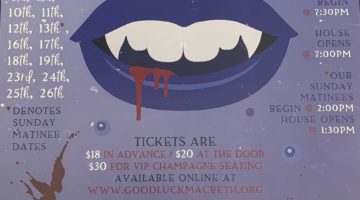
Photo courtesy of Jennifer Sanchez. Actress and assistant professor of Theater and Performance Studies, Krystil Tift, presents on two Afro-Carribean lesbian poets to a crowd in the Wells Fargo Auditorium on Friday, March 29. The rest of her presentation also focused on intersectionality in performance poetry, especially among black, queer and female artists.
Krystil Tift is not only an assistant professor of Theater and Performance Studies at Kennesaw State University, but she’s also an incredibly talented actress who’s been featured in films and television shows like “Hall Pass”, “Greenleaf” and “One Tree Hill”. Her in-depth knowledge of intersectionality and how it fits into black performance poetry was shared with an intimate audience in the Wells Fargo Auditorium of the Mathewson-IGT Knowledge Center, on Friday, March 29.
Tift started her presentation with a rundown of the black arts movement during the 1960s and ‘70s — a time in which performance art was mainly dominated by white men. The black arts movement, Tift explained, was a response to the lack of representation and inclusion in the art world and was born with the help of black men like Ed Bollins, Larry Neal and Amiri Baraka, who found it necessary to create theaters for black students interested in performance.
“However, they were missing a component, right?” Tift asked the audience. “The component that is usually already behind black men’s activism — and that is black women.”
Tift went on to introduce several black women who aided in the birth of the 1960s and ‘70s black arts movement, although they are not recognized as much as men in the movement. She named women like Glenda Dickerson, Barbara Ann Teer, Adrienne Kennedy and Alice Childress, who were directors, producers, playwrights, actresses and more during that time. From there, Tift explained concepts like black feminism and womanism, which champion black women and value intersectionality in all realms of life.
Womanism, according to Tift, was first defined by Alice Walker (author of “The Color Purple) and emphasizes spirituality, connections with others and nature as a part of the female experience. It also deals with ideas of sexuality.
“A womanist is a woman who loves women,” Tift said, quoting Walker, “loves women’s culture, loves women sexually and non-sexually, loves men sexually and non-sexually […] A womanist loves music, loves dance, loves the moon, loves the spirit, loves love and food and roundness, loves struggle, loves the folk, loves herself regardless. Womanist is to feminist as purple is to lavender.”
From there, Tift proceeded to present a widely-renown theater piece by Ntozake Shange, called “for colored girls who have considered suicide/when the rainbow is enuf”. Published in 1976 as a collection of poems, the piece focuses on seven black women struggling through times of mental illness, domestic violence, sexual violence, suicidal ideation, death and more. Tift brought to light a factor of the poems that was vital to understand, which was the decision to use “ladies” as the names of characters (Lady in Red, Lady in Yellow, Lady in Purple, etc.)
“Historically, black women haven’t been thought of as ladies,” she said. “Or even women. Since American slavery, they were thought of as, what Zora Neale Hurston calls, ‘the mules of the world.’”
Tift followed this explanation with a tear-jerking performance of one of the poems from the collection, narrated by the Lady in Red. In the piece, the Lady in Red suffers through an incredibly abusive relationship with a Vietnam veteran suffering from PTSD and concludes with him dropping their two children from a fifth story window to their deaths. The audience erupted into applause following the performance, after which Tift showed a clip of the 1982 television adaptation of the theater piece.
Right before the event’s Q+A and subsequent closing, Tift presented two black lesbian feminist poets from the Caribbean, named Staceyann Chin and Lenelle Moïse, who each used intersectionality in their poetry. She showed clips of one poem from each artist. In the first clip, Chin gave a moving performance of a poem about the kind of world she wants to live in as a lesbian woman of color. In the second clip, Moïse delivered a poem about the Creole word for lesbian, “madivinez”, which is considered vulgar to Creoles but beautiful to her.
The night ended with a Q+A section in which Tift was asked about her own identity, and talked about her experiences as a queer black woman in America. Many in the audience asked her for advice or words of wisdom, and even for a performance of her own art. Tift graciously granted them with a moving song and monologue she wrote about loving, being sexually assaulted and learning to live happily.
Carla can be reached at csuggs@nevadasagebrush.unr.edu, or on Twitter @carla_suggs.












